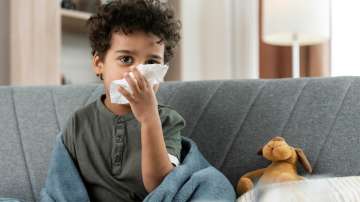As we witness seasonal changes and an increase in pollution levels, it is crucial to proactively implement measures to safeguard our children from the harsh effects of both cold weather and environmental pollutants. In today's context, where the Air Quality Index (AQI) continues to decline, ensuring the well-being and safety of our youngsters becomes paramount.
The Impact of Cold and Pollution on Children's Health
When asked about the impact of cold and pollution on children's health, Dr Praveen Khilnani, Chairman - Pediatrics, Pediatric Pulmonology and Pediatric Critical care, Paediatrics, Medanta, Gurugram, said that children's respiratory systems are in the developmental stages, and their immune systems may not be as resilient as those of adults. This makes them particularly vulnerable to the detrimental effects of both cold weather and pollution. Common health issues that children often face in these conditions include coughs, colds, and the exacerbation of pre-existing conditions such as asthma.
Tips to Protect Children from Cold and Pollution
Warm Clothing
Proper clothing is a key defence against the cold. Dress your children in layers to trap warmth and regulate body temperature. Ensure that they wear insulated jackets, hats, gloves, and scarves to protect against the biting cold.
Indoor Air Quality
Indoor air quality significantly impacts children's health and well-being. Invest in air purifiers to eliminate pollutants and allergens. Keep living spaces well-ventilated and avoid smoking indoors. Regularly clean carpets, curtains, and bedding to minimize dust and allergens. A clean and well-ventilated home promotes respiratory health for your younger ones.
Healthy Nutrition
Inculcate immunity-boosting foods rich in vitamins and minerals in your child’s diet. Serve warm meals and encourage the intake of hot liquids like soups and herbal teas. Adequate nutrition strengthens the immune system and helps combat seasonal illnesses.
Outdoor Protection Measures
While outdoor play is essential for children's development, it's crucial to protect them from harsh weather conditions. Limit outdoor playtime during peak pollution hours and choose parks or play areas away from busy roads. Additionally, monitor air quality levels and consider using pollution masks for added protection during outdoor activities.
Regular Health Check-ups
Schedule visits to the paediatrician to track growth, and development, and address any emerging health concerns. Vaccinations and preventive care play a crucial role in building a strong defence against common illnesses, ensuring a healthy and happy childhood.
Hygiene Practices
Teach and reinforce good hygiene practices in children. Regular handwashing helps prevent the spread of germs and infections. Encourage proper respiratory hygiene, such as covering mouths and noses when coughing or sneezing. These simple habits go a long way in safeguarding your child's health, especially during the cold and flu season.
Educating Children
Educate your children about the importance of protecting themselves from the cold and pollution. Teach them to recognize signs of discomfort and understand the significance of staying warm and breathing clean air. Instilling these habits early on empowers them to take responsibility for their well-being.
However, addressing common health issues like coughs, colds, and exacerbated conditions such as asthma requires prompt medical attention. Seeking guidance from a doctor is crucial to ensuring the overall well-being of our children.
ALSO READ: 5 superfoods to eat for a healthier brain
